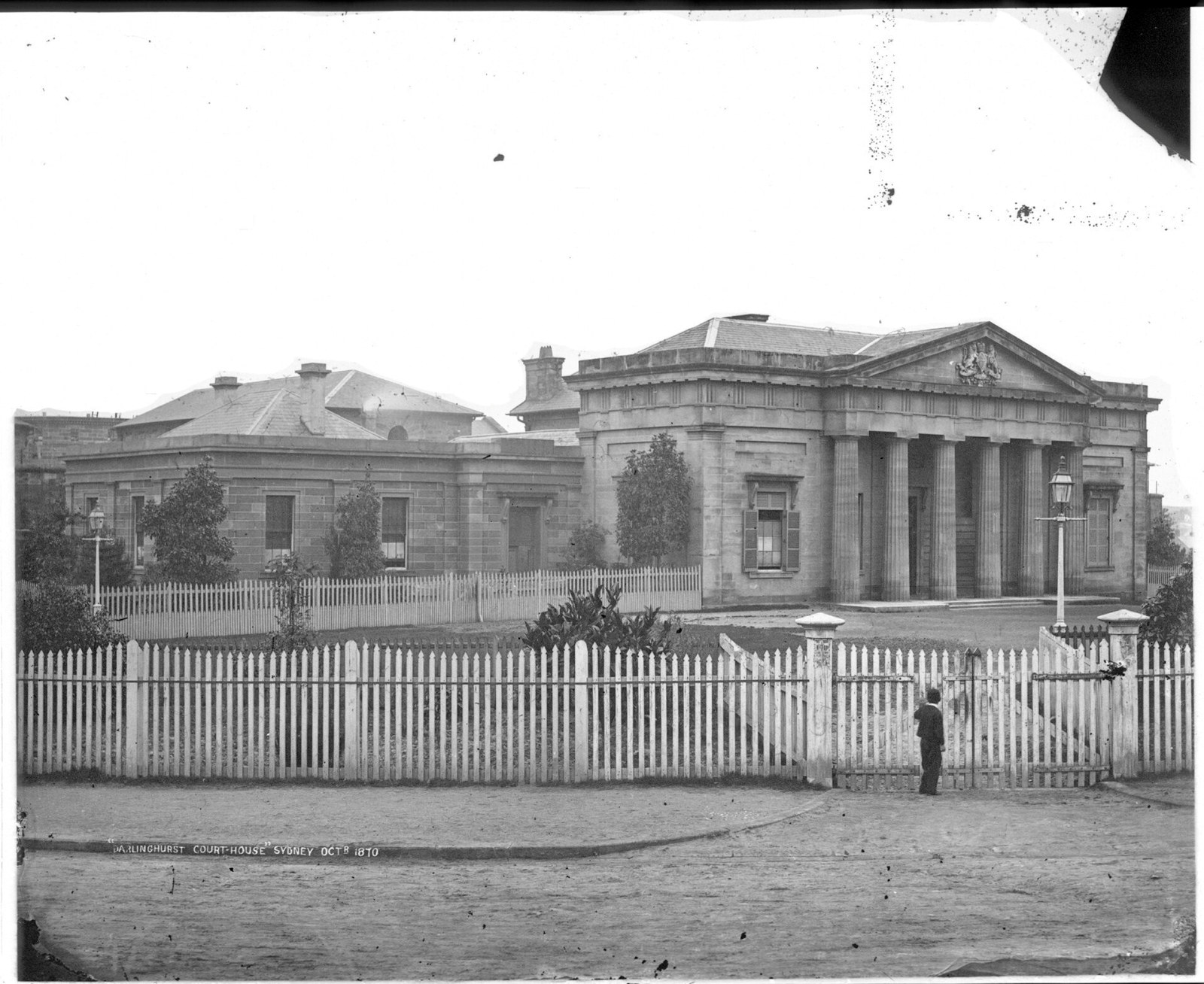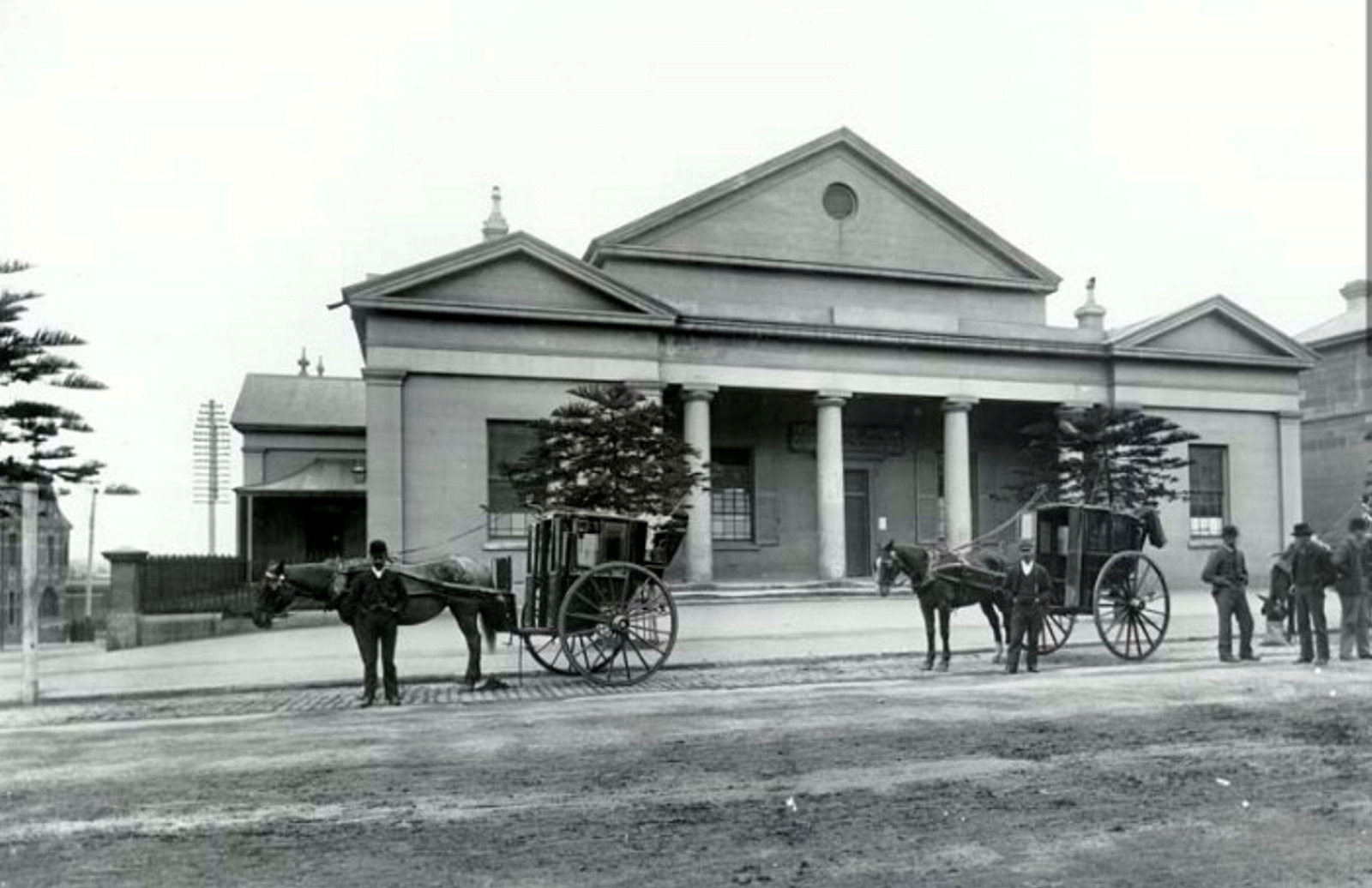Supreme Court guide
The Supreme Court heard all matters that were punishable by death until the abolition of the death penalty in 1955.
Historical overview
As a result of the criticisms of the existing judicial arrangements in NSW by Commissioner Bigge, the existing Court of Criminal Jurisdiction and the Supreme Court of Civil Jurisdiction were abolished. The Supreme Court was established under the Third Charter of Justice (1823), operating with a number of jurisdictions from 1824.
Indexes to early criminal records
Search the index

Criminal court records index 1788–1833
A valuable resource relating to the NSW colonial justice system and for research into criminals, convicts and crimes during the early years of the Colony
Main series of records
Clerk of the Peace, Supreme Court
The bulk of records relating to cases heard by the Supreme Court: Criminal Jurisdiction were created by the Clerk of the Peace (the predecessor of the Office of the Director of Public Prosecutions).
The Clerk of the Peace received witnesses' statements and made reports of trials and sentences, becoming a de facto registrar for the Supreme Court Criminal Jurisdiction.
Series | Title | Dates |
|---|---|---|
NRS-831Oct 1835-Jul 1837 [4/6448], Reel 684;Aug 1838-Jul 1843 [X852], Reel 2720;May 1847-Mar 1909 [4/6449-50A, 4/6451-52A & 4/6453-54A], Reels 685-686; [4/6450B, 4/6452B, 4/6454B & 4/6455A-B], Reels 3621-3623; and1920-23 [4/6456], Reel 3623 | Calendar of persons tried on criminal charges in Sydney Courts (Court books)The Calendars show: date of trial, name of vessel in which the accused arrived in the Colony (early records only), condition (ie. ticket of leave, bond), when and where committed, type of jury, charge, sentence, date of verdict, remarks.Later volumes show the prisoners gaol number, occupation and the name of the judge presiding. The calendars are incomplete and unindexed. | 1835-1923 |
NRS-883[19/13202-13] | Registers of cases heard before the Central Criminal CourtThe registers show for each cause heard: names of Crown Prosecutors, prisoner, counsel for the defence, witnesses for the Crown and the defence (noting days of attendance, whether bound or subpoenaed), judge arraigning, judge presiding, date and place of committal, dates of arraignment and trial, defendant's plea, verdict, sentence passed and any remarks. | 1886-1948 |
NRS-8801824-1836 [T128-70];1837-1946 [9/6307-7405, 4/9090 [photocopy City COD392]; [10/11048 part, 10/10503 part, 10/8166-81 part]. | Papers and depositions, Supreme Court, Sydney and on CircuitDepositions are papers relating to the trial, including statements by witnesses. They may be annotated with the verdict and the name of the Judge presiding. | 1824-1946 |
Supreme Court, Criminal Jurisdiction
Series | Title | Dates |
|---|---|---|
NRS-134781824-1832 [X727; X48], Reel 2756;1835, 1837-1847 [X67, X850-51] | Annual returns of prisoners tried before the Supreme Court at Sydney and on CircuitThe returns usually record name of prisoner, offence, date of trial, verdict, sentence, and if remitted and why. The returns are frequently duplicated, one copy probably having been sent to the Colonial Secretary and the other retained in the Supreme Court. | 1824-1847 |
NRS-13480[X728-31], Reel 2389; [X43-44], Reel 2756; [X46-47], Reel 2756; [X845-49], Reel 2389; [X880-900], Reels 2394-2395 | Session returns of persons tried and convicted by the Supreme Court at Sydney and on circuitThe returns record name of prisoner, condition (native born, ticket of leave, free by servitude etc.), offence, verdict, judgment and alteration or commutation approved by the Governor and Council. From November 1833 whether the jury was civil or military is also noted, and later the name of the Judge and his recommendation | 1825-1910 |
NRS-13492[9/2630-35] Reels 1860-1861 | Registers of criminal indictmentsThe registers provide details of when and where tried; name of prisoner; judge; date; verdict and sentence. They are indexed and should be checked if there is a possibility that the case may have been heard in the Supreme Court for this period. | 1863-1919 |
NRS-13477[T19-T115] | Informations and other papersFor more details of cases 1824-36, see the unpublished inventory Index to Supreme Court Criminal Jurisdiction, 1824-36, available in the reading room. | 1824-1947 |
Related records
Coroners' records
Registers of coronial enquiries can establish basic details such as cause of death, name of accused and locality of trial. Detailed reports have not survived for the years 1828 to 1911.
Court of Criminal Appeal, 1912+
See the catalogue under Agency No. 1054 Court of Criminal Appeal for details.
Court of Criminal Jurisdiction, 1788-1824
See the catalogue Agency No. 535 Court of Criminal Jurisdiction for further information. The index to cases heard by the Court of Criminal Jurisdiction, 1788-1824 is indexed by the name of the accused. The index includes details of the crime, in some cases the name of the victim and locality and details of the location of records.
Court Reporting Office, Transcripts, 1899-2001
See NRS-2713 Transcripts of evidence of the various Courts and Royal Commissions and Boards of Inquiry in our catalogue. Transcripts for early years are arranged by the name of the judge and the jurisdiction of the Court. Later they are arranged by the jurisdiction of the Court and the surname of the person tried. Transcripts of closed or in-camera proceedings are closed to public access for 75 years. All other records in this series more than 20 years old are open to public access.
Crown Solicitor's records
See the catalogue under 'Crown Solicitor'. NRS-3595, Judgment books, Supreme Court, Criminal Sessions, 1835-1860, are of particular interest.
Guide to Convicts and Convict Administration
Also known as the Convict Guide, available online. See Chapter 11: Colonial trials and court records.
Judges' notebooks
Judges' notebooks survive from c 1828, but are not complete. See the catalogue under the name of the judge. Newspapers may give the name of the judge, as may the registers listed above.
Prison records
See the catalogue under Corrective Services for details. Post 1870s prison records may include photographs of prisoners with details of conviction and personal history. There is also an online index to Gaol Photograph Description Books.
Reports of Crime for Police Information, 1854-62 and Police Gazettes, 1862-1982
These publications include details of crimes committed, criminals wanted, criminals apprehended, prisoners discharged See the catalogue for further information and a list of records.
Access
Supreme Court (including Clerk of the Peace) Criminal matters
Records relating to the hearing of criminal matters, including case files, indexes and associated control records are open to public access 75 years after file completion. To obtain permission to view and copy records that are less than 75 years old please contact the Supreme Court of NSW.
Further reading
Decisions of the Superior Courts of New South Wales, 1824-1899 website.
J. M. Bennett, A history of the Supreme Court of New South Wales. Sydney, Law Book Company Limited, 1974.
Bruce Kercher, T.D.Castle, Dowling's Select cases, 1828 to 1844: decisions of the Supreme Court of New South Wales. Sydney, Francis Forbes Society for Australian Legal History, 2005.
G.D. Woods, A History of criminal law in New South Wales: the colonial period, 1788-1900. Annandale, NSW: Federation Press, 2002.
The series NSW State Archives: Supreme Court; NRS 13696, Miscellaneous Correspondence Relating to Aborigines, 1797, 1804-06, 1814-16, 1824-40; [5/1161] COD 294A and B has been digitised and transcribed as part of a collaborative project involving Macquarie University's Centre for Comparative Law, History and Governance and NSW State Archives.
For criminal records prior to the establishment of the Supreme Court in 1824 see the list of cases heard by the Court of Criminal Jurisdiction, 1788-1824.
Watch the webinar

Records of the higher courts
Higher courts include the Court of Quarter Sessions, the District Court and the Supreme Court. This webinar explores the records of these courts and how to find them
Higher courts

Court of Criminal Jurisdiction guide
The establishment of a NSW Court of Criminal Jurisdiction was authorised by King George III, through the First Charter of Justice (Act 27 Geo.III c.2) 1787

Quarter Sessions guide
The Quarter Sessions court was an intermediate court with greater powers than the local court or bench but not as great as the Supreme Court